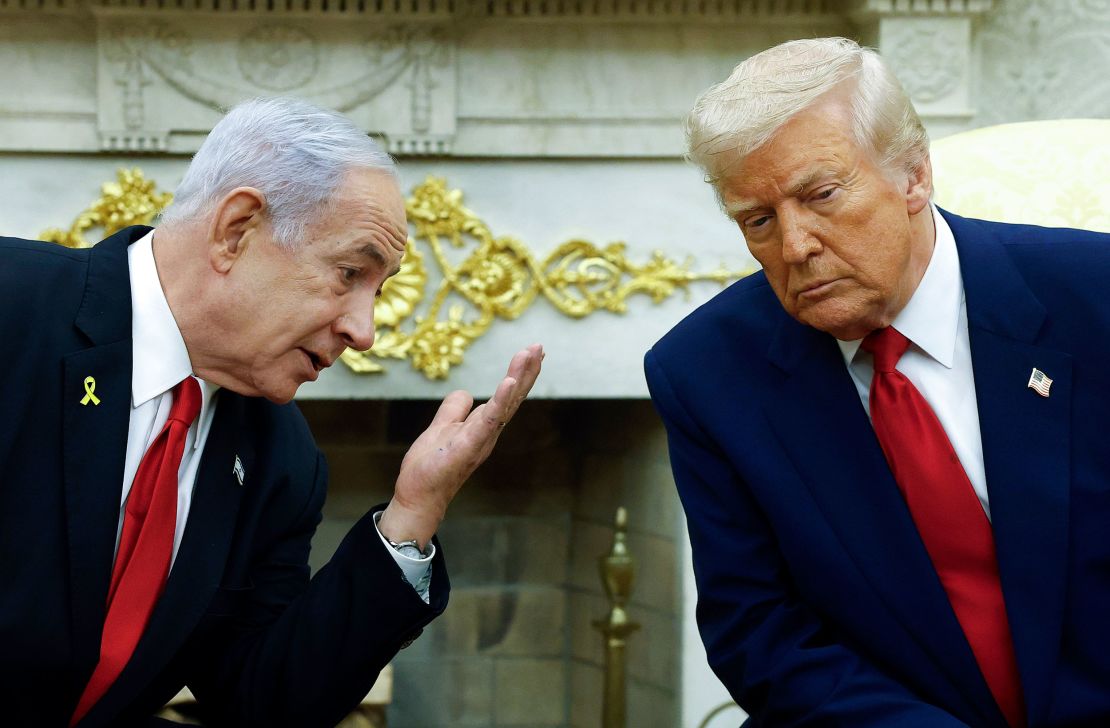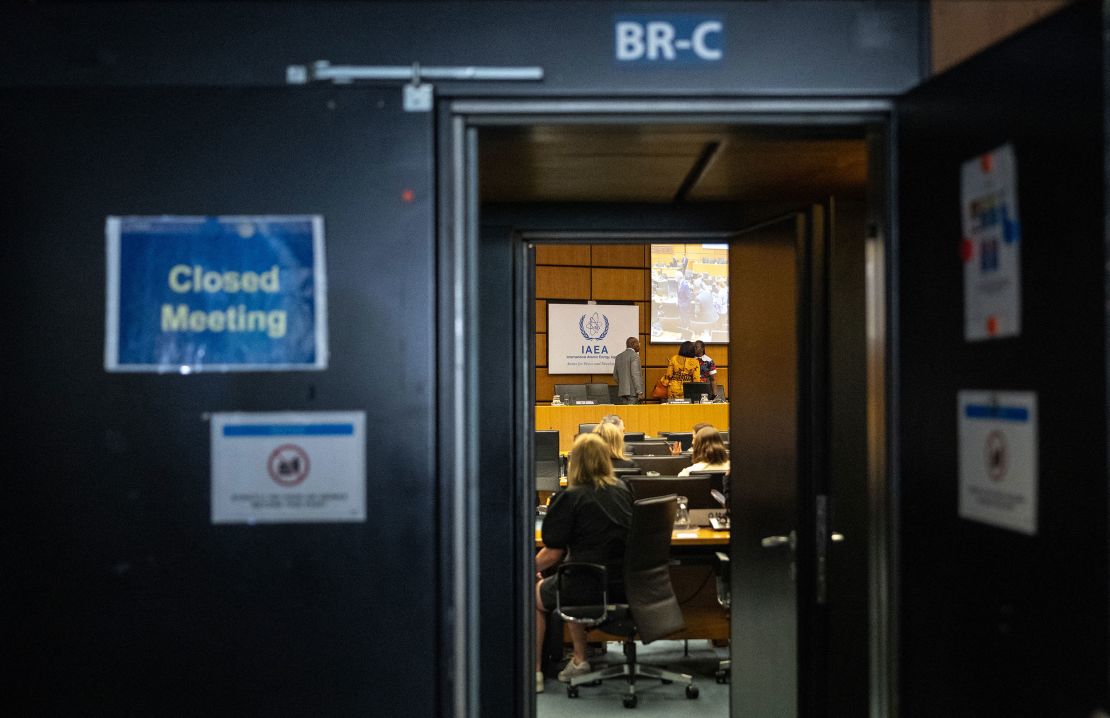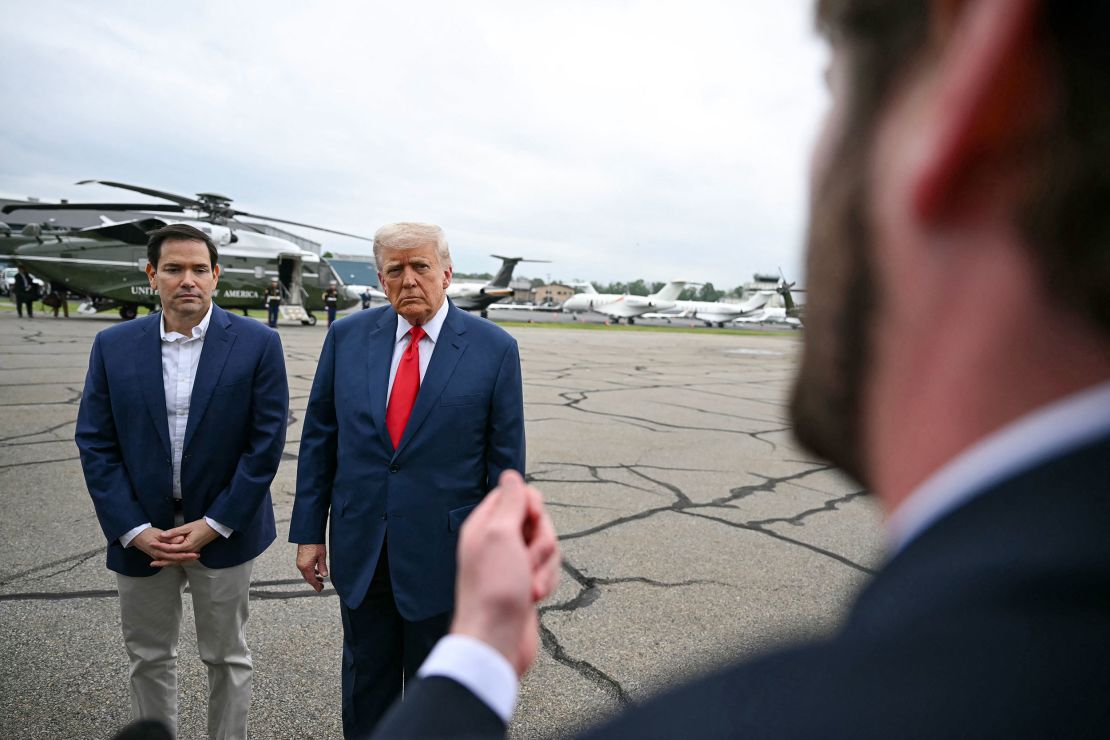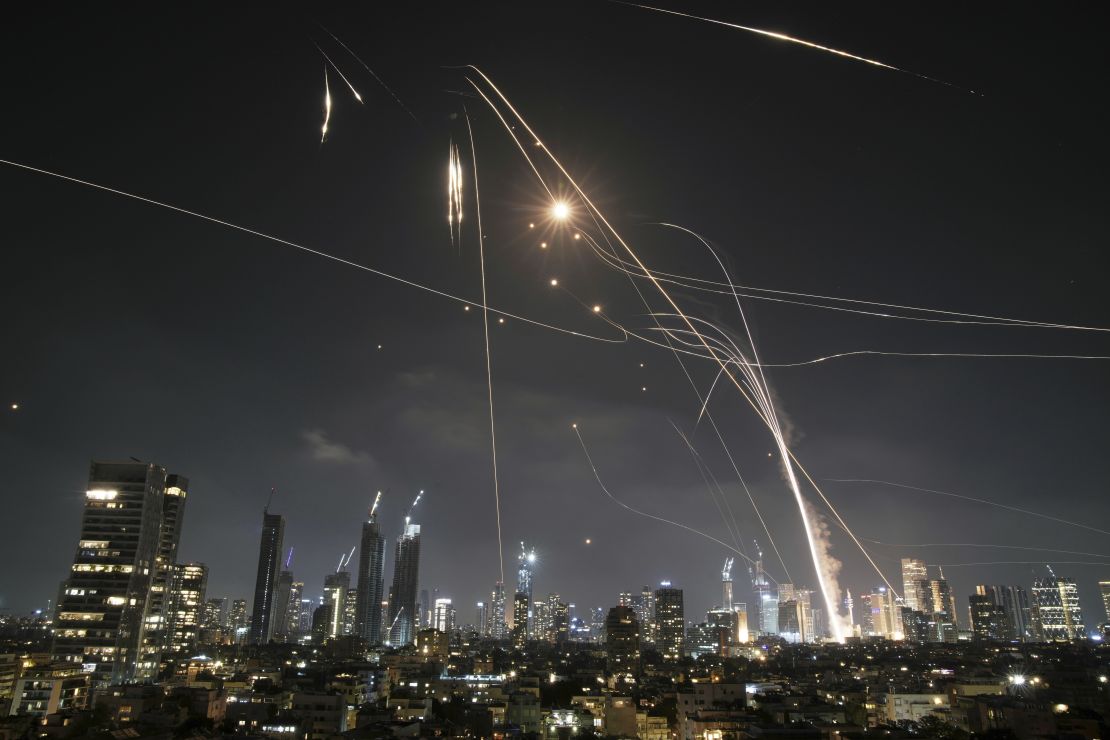CNN
—
President Donald Trump issued an ultimatum this spring to Iran’s Supreme Leader: Strike a nuclear deal in 60 days, by mid-June, or face consequences. He urged Israeli Prime Minister Benjamin Netanyahu to hold off on attacking Iran to give the negotiations space to progress.
But even as Trump administration figures were publicly projecting determination to pursue a diplomatic solution, Israel was privately warning the US that it had already decided to attack.
Late last month, a small group of House lawmakers visited Netanyahu in Jerusalem, where he stated firmly that Israel was going to strike Iran – and they were not seeking permission from the US to do so, according to a person who attended the meeting and another person briefed on it.
“We fight or we die,” Netanyahu told the lawmakers, according to the people.
In response, two of the lawmakers in attendance May 26, Rep. Michael McCaul of Texas and Rep. Michael Lawler of New York, urged Israel to coordinate with the US and stressed that the country must let Trump’s 60-day ultimatum for Iran run its course.
On Friday, day 61, Israel launched unprecedented strikes on Iran, targeting its nuclear program and military leaders.
“This didn’t just happen overnight,” the attendee told CNN, adding that Trump’s 60-day deadline “was not a bluff.”
Trump made a similar point to CNN Friday. “Iran should have listened to me when I said — you know, I gave them, I don’t know if you know but I gave them a 60-day warning and today is day 61,” he said.
The attack was much longer in the making – the result of years of meticulous planning by Israel and days of high-stakes talks between Tel Aviv and Washington, according to officials CNN spoke to in both countries. It has long been a priority for Israel to destroy Iran’s nuclear capability, which Netanyahu described Friday as a “threat to Israel’s very survival.”
The Trump administration knew in advance it was coming and that Netanyahu was unlikely to be dissuaded, with the US rallying international pressure on Iran even as diplomats sought to keep negotiations alive to the last minute.

Trump has long fashioned himself a dealmaker and, after pulling the US out of the Obama-era Iran nuclear deal in 2018, made clear at the beginning of his second term that he would like to find a new diplomatic solution with Iran.
But in the intervening years, Iran had made significant strides toward obtaining a nuclear weapon. The president and top officials had asserted Iran could not obtain a nuclear weapon – but it was unclear whether they would allow Iran to enrich uranium, which hawks in the US and Israel strongly opposed, or how any deal would be different from the Obama agreement.
Israel, meanwhile, was watching Iran’s enrichment efforts with heightened concern and making meticulous plans for an attack. The Israeli intelligence agency Mossad put spies on the ground inside Iran and smuggled weapons into the country, according to Israeli security officials, and would use the weapons to target Iran’s defense from within. The officials said Israel also established a base for launching explosive drones inside Iran.
Israel’s Defense Minister Israel Katz on Friday said the strikes’ timing was aimed at both thwarting Iran’s capabilities and removing the threat of destruction from Israel.
“We are at a key point where, if we miss it, we will have no way to prevent Iran from developing nuclear weapons that will threaten our existence,” he said. “We have dealt with Iran’s proxies over the past year and a half, but now we are dealing with the head of the snake itself.”
Trump had long warned of potential military strikes if a new nuclear deal wasn’t reached, and Tehran, in turn, said that any attack on it would drag the US into a broader Middle Eastern conflict.
Negotiations on a new deal, led by special presidential envoy to the Middle East Steve Witkoff and moderated by Oman, began in April. The group last met for talks on May 23 in Rome – three days before Netanyahu told US lawmakers he planned to strike – with a sixth round initially scheduled for Sunday in Muscat.
On Thursday, hours before the Israeli strikes began, the International Atomic Energy Agency board, a United Nations nuclear watchdog, met and adopted a resolution declaring Iran in breach of its non-proliferation obligations. The resolution ultimately passed with 19 nations voting in favor, three against, and 11 abstentions, according to Reuters.


Two days earlier, the US sent a demarche to eight countries that it viewed as potentially persuadable, urging them to either vote with the US on the IAEA vote or not vote at all, according to a US official. The move marked a major engagement from the US on the issue, which Israel pointed to as one of its rationales for its strikes.
Still, White House officials continue to argue after the strikes that the president is committed to salvaging the ongoing nuclear talks. Witkoff is “ready” to meet Iranian officials when they are, whether it be in Oman on Sunday as previously scheduled or at some date thereafter, according to a source familiar with discussions.
Trump suggested Friday that Iranian officials had been in touch with him as he continued to express optimism about a deal.
“They may have another opportunity. We’ll see,” Trump said. “They’re calling me to speak,” Trump said in an interview with NBC News.
Asked who was calling, he said, “The same people we worked with the last time … Many of them are dead now.”
The US had a relatively clear picture of the scope of the Israeli operation as early as last week, when some intelligence officials were already receiving multiple updates daily and were planning for different contingencies depending on how Iran responded, according to one source with direct knowledge of that planning.
Although Israel minimized what it shared with the Trump administration, that source said the US understood the targets and order of operations – even if the extent of the damage to Iran, including losses to its leadership, and the question of how Iran would respond remained unknown.
On Sunday evening and Monday, Trump and top advisers, including Vice President JD Vance, Defense Secretary Pete Hegseth, and Secretary of State Marco Rubio, huddled at Camp David for previously scheduled meetings on a number of foreign policy issues. Among the topics of discussion at the retreat: how to get an Iran nuclear deal done without an escalation. And the clock was ticking.

That same weekend Witkoff engaged in direct messaging with his Iranian counterpart in the talks, Foreign Minister Abbas Araghchi, according to a source familiar with the matter.
Early in the week Witkoff also reached out to the Omani intermediaries with a new idea for a possible deal framework, according to a source familiar with the matter. The initial proposal from the US tabled during the 5th round of talks in Rome – which Iran was privately opposed to – was changing. It was unclear what prompted the proposal of a new concept, but by Friday, some people involved in the talks began to think that it was a stalling tactic by Witkoff.
But a senior administration official said no stalling tactics were used, with Witkoff working “from the outset to reach a deal under the timeline set by President Trump.”
Before he departed Camp David, the president and Netanyahu spoke by phone to discuss Iran. During their call, Trump asked Netanyahu to stop talking about an attack on Iran, a source familiar with the conversation said, and halt the leaks and reports about plans. After the call, the president cast some doubt on prospects nuclear talks would bear fruit.
“We’re trying to make a deal so that there’s no destruction and death. And we’ve told him (Netanyahu) that, and I’ve told him that. I hope that’s the way it works out, but it might not work out that way. We’ll soon find out,” Trump told reporters.
In a podcast taped the same day, Trump acknowledged to the New York Post he was getting “less confident” about the possibility of a deal.
Trump’s rhetoric was becoming less optimistic at the same time US officials were beginning to believe that Iran was not going to accept a deal with the US terms.
Public signs that something was afoot began to emerge on Wednesday afternoon, US time, when the US State Department prepared to order the departure of non-essential personnel from the US embassy in Iraq and US consulate in Erbil, as well as nonessential personnel and family members at the US embassies in Bahrain and Kuwait, due to what sources described as increased security risks in the region. The president was aware of the decision, a White House official said at the time.
Trump began to nod publicly at the possible attack, warning during an East Room event about the potential for a “massive conflict” in the Middle East that could take place “soon.”
“We have a lot of American people in this area, and I said, look, we gotta tell them to get out cause something could happen – soon. And I don’t want to be the one that didn’t give any warning and missiles are flying into their buildings,” he said.

Top Trump officials were instructed to call their counterparts in the region on Thursday with a message that was heavy on the need for diplomacy and emphasized that the US was not involved. They were not always successful in getting through; Tulsi Gabbard, for example, was unable to reach her Israeli counterpart.
By late Thursday, it was clear to the Trump administration that Israel could not be dissuaded from launching the attacks, according to two other US officials who spoke to CNN at the time. One of the officials said the US thought it might be able to delay the operation by a matter of hours to put in place protections for its own forces in the region, but no more.
Trump spoke with Netanyahu multiple times on Thursday. Trump convened a Cabinet-level meeting Thursday as the strikes took place. A carefully balanced message soon went out.
“We are not involved in strikes against Iran and our top priority is protecting American forces in the region,” Rubio said in a terse statement. “Israel advised us that they believe this action was necessary for its self-defense. President Trump and the Administration have taken all necessary steps to protect our forces and remain in close contact with our regional partners. Let me be clear: Iran should not target U.S. interests or personnel.”
Top Republicans and Democrats in Congress were not surprised that Israel took the step, though some were privately taken aback by the scope.
House Speaker Mike Johnson was briefed ahead of the strikes on Thursday, one person said, though there was no Gang of Eight briefing in Congress, per two congressional sources. Top lawmakers, including committee leaders, were scrambling for briefings from the administration on Thursday night and Friday.
And even though US diplomats had worried about the increasing likelihood of an Israeli strike on Iran, they were still surprised when it happened Thursday night. “Maybe Donald Trump knew but I don’t think the rest of us did,” one senior US diplomat told CNN.
Going into the attacks, intelligence officials believed Iran would have to take stock of what they had left before retaliating, a US official said.
The regime would have to assess whether it has enough left to be a credible deterrent to ensure its survival – or whether they are already on a path to being deposed. If the latter, officials expected Iran could respond with strategic strikes using what was left of their most sophisticated weapons and terror attacks using their various proxy groups in the region.

Initial battle damage assessments indicate that the Israeli strikes on Iran’s Natanz nuclear facility were extremely effective and went far beyond superficial damage to exterior structures, knocking out the electricity on the lower levels where the centrifuges used to enrich uranium are stored, two US officials told CNN.
“This was a full-spectrum blitz,” said another source familiar with early damage assessments.
By Friday night, Iran had carried out attacks on “dozens of targets, military centers and air bases,” belonging to Israel, the Islamic Revolutionary Guard Corps said in a statement. It was not clear how much more would be coming.
The US is also closely monitoring events in Iraq, where there is a particular concern about the safety of US troops – not only because of the proximity to the Iranian border but also because there are a number of deeply ideological proxy militia groups loyal to Iran operating there.
And although US intelligence officials believe Iran will respond to Israel directly first, they also believe it’s possible that Iran may eventually launch cyber attacks against domestic US critical infrastructure in retaliation.
“The situation is pretty fluid,” a US official said Friday as Iran’s response began. “I think it’s gonna be a long night.”

